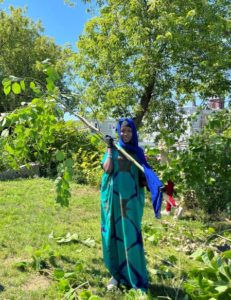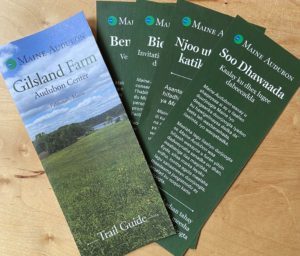Just as biodiversity strengthens natural systems, the diversity of human experience strengthens conservation efforts for the benefit of nature and all human beings.
Maine Audubon is committed to embracing human diversity in all the communities where we work. We are dedicated to increasing the diversity of our staff, board, volunteers, members, and supporters and “bringing nature home” to all people and all communities.
Equity, diversity, and inclusion (EDI) matter to Maine Audubon because the contributions, experiences, perspectives, and values of diverse individuals and communities make conservation efforts stronger. Maine Audubon aims to expand our network’s reach and engage more people in our mission.
We respect and value the individuality of each member of our community, and we are committed in all we do to freedom from discrimination based on race, color, religion, sex, age, sexual orientation, gender identity and expression, disability, national or ethnic origin, politics, or veteran status.
Respect, inclusion, and opportunity for all people assures a healthier, more vibrant future for all of us who share our planet.
News & Updates
Considerations of the Audubon Name
(UPDATED June 13, 2023)
John James Audubon’s contributions to conservation and the study of birds must be viewed alongside his promotion of racist ideas and actions that have contributed to the centuries of institutional racism derived from slavery in America. We are aware that some National Audubon chapters, as well as one independent Audubon, have made the decision to change their name; others are in different stages of consideration including National Audubon. Though our organization was not created by Audubon, it does bear his name. Maine Audubon has embarked on work to explore the namesake issue, and to consider the possibility of a name change. Our work on equity, diversity, and inclusion (EDI) had begun long before this information came to light and the facts of Audubon’s history have strengthened our resolve to ensure that the understanding, enjoyment, and protection of wildlife in Maine are available to everyone. Our EDI commitment is one of the cornerstones of our strategic planning.
Full statement and more on our process >
Reflections on John James Audubon
Maine Audubon, and the other Audubon organizations around the country, are asking themselves what it means to carry the name John James Audubon. In the coming weeks, we will be looking into our own history as well as charting our future, one in which we acknowledge and recognize inequity inherent in many environmental policies, and work to be more inclusive, diverse, and equitable both internally and in Maine’s communities. Read the full article >
Andy’s Note: Time to Listen
We know we have much work to do to understand and address inequity in our organization and systems. As we undertake this important work, we’ve realized that one of the first steps we should take is to listen. Our staff is seeking out and listening to Black voices in the environmental education and conservation community and our board and staff are devoting time at each meeting to discuss our anti-racist work. We want to hear from you. What are some ways in which we can make a real difference in our community? How can Maine’s environmental organizations become anti-racist in everything they do, both internally and externally?
We invite you to share your comments, feedback, and criticism with us by sending email to media@maineaudubon.org. We are committed to sharing our progress with you and will report back on what we hear from you and our next steps. Thank you for your support as we undertake this essential work for meaningful change.
Joint Statement on Racial Justice
June 4, 2020
Recent Work
On a blistering hot day this past July, if you were passing by 75 Lincoln Street in Lewiston, you would have been treated to quite a sight: about a dozen young women with shovels, rakes, and work gloves, working side by side with members of the Lewiston Public Works department, planting trees. Read the blog post >
Habitat Magazine, Spring 2023
Last year, Habitat readers and Maine Audubon members read about Portland third graders studying Atlantic Salmon for a unit that blends STEM and Wabanaki Studies. That unit continues for a new batch of third graders this year, and we’ve also just launched a new unit for kindergarteners across the district. Approximately 500 students will celebrate Maple Thanksgiving by visiting and tapping Sugar Maple trees throughout the city, hearing about the Wabanaki traditions and new business ventures from our friends at Passamaquoddy Maple, and learning from Maine Audubon staff about the role of sap-producing maples for wildlife and habitat. Maine Audubon is proud to partner with Portland Public Schools and Wabanaki advisors on units that effectively blend STEM, outdoor learning, and Wabanaki Studies for every student in the district.
Habitat Magazine, Winter 2022/23
A chorus of happy shouts could be heard all along the paths at Shaw Park in Gorham for several days in October, as students observed birds and bugs, examined fish, and listened to the roar of the waterfall over Gambo Dam on the Presumpscot River. Maine Audubon worked with Portland Public Schools to host a visit for every third grader in the district (approximately 500 students). Students observed wildlife and habitat at three stations of water–still, flowing, and cascading. After experiencing this site and the impacts of dams, these same students will rear endangered Atlantic Salmon in their classrooms this spring as part of a yearlong unit that blends Wabanaki Studies and STEM.
Funded by a grant from the Institute for Museum & Library Sciences.
We were delighted to launch a new youth development and habitat stewardship program this summer in Lewiston. Maine Audubon partnered with Healthy Homeworks and Maine Community Integration to pilot Sprout Lewiston, designed to engage local youth in restoring habitat and beautifying their communities. Over the course of five weeks, a total of 16 teens learned about ecology, met local experts, restored native plants and wildlife habitat in Lewiston public parks, and had some fun in the outdoors!
In the news: Sprout Lewiston growing a love for ecology and education (Lewiston Sun Journal)
Maine Audubon welcomes all visitors to our centers and sanctuaries, and we are committed to making our spaces accessible and inviting. We are now offering our Gilsland Farm trail guides in French, Portuguese, Swahili, and Somali, and our Scarborough Marsh guide is also available in French. These guides are available on our website and in printed form at the Visitor Centers as well.


